|
|
|
Sort Order |
|
|
|
Items / Page
|
|
|
|
|
|
|
| Srl | Item |
| 1 |
ID:
179977
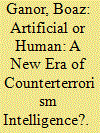

|
|
|
|
|
| Summary/Abstract |
A new revolution has begun in counterterrorism—the Artificial Intelligence (AI) revolution. The AI revolution has had a significant impact on many areas of security and intelligence. The use of AI and big data in general, and in the field of intelligence and counterterrorism in particular, has led to intense debates between supporters of the continuation and expansion of the use of this technology and those who oppose it. The traditional delicate balance between effectiveness in the fight against terrorism and the liberal democratic values of society becomes even more crucial when counterterrorism engages in AI and big data technology.
|
|
|
|
|
|
|
|
|
|
|
|
|
|
|
|
| 2 |
ID:
063025
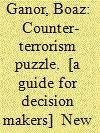

|
|
|
|
|
| Publication |
New Brunswick, Transaction Publishers, 2005.
|
| Description |
xxii, 334p.
|
| Standard Number |
0765802988
|
|
|
|
|
|
|
|
|
|
|
|
Copies: C:1/I:0,R:0,Q:0
Circulation
| Accession# | Call# | Current Location | Status | Policy | Location |
| 049791 | 363.32/GAN 049791 | Main | Withdrawn | General | |
|
|
|
|
| 3 |
ID:
120432
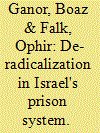

|
|
|
|
|
| Publication |
2013.
|
| Summary/Abstract |
An effective de-radicalization process in prisons is intended to facilitate the renouncement of violence and terrorism by those that have carried out such offenses. A key lesson that can be drawn from Israel's de-radicalization efforts is that it is possible, indeed recommended, to treat inmates-regardless of their level of radicalization-in a dignified and humane manner. However, Israel's ability to significantly de-radicalize security prisoners is limited if it is at all existent in its current form. Security prisoners with the potential for positive change should be placed in a different, perhaps foreign setting. This article provides an overview of Israel's prison system, the challenges it faces, its efforts to de-radicalize security inmates and suggests additional courses of action.
|
|
|
|
|
|
|
|
|
|
|
|
|
|
|
|
| 4 |
ID:
081136
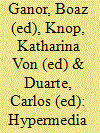

|
|
|
|
|
| Publication |
Amsterdam, IOS Press, 2007.
|
| Description |
viii, 289p.
|
| Series |
NATO scince for peace and security
|
| Standard Number |
9781586037611
|
|
|
|
|
|
|
|
|
|
|
|
Copies: C:1/I:0,R:0,Q:0
Circulation
| Accession# | Call# | Current Location | Status | Policy | Location |
| 053248 | 303.625/GAN 053248 | Main | On Shelf | General | |
|
|
|
|
| 5 |
ID:
123343
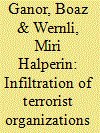

|
|
|
|
|
| Publication |
2013.
|
| Summary/Abstract |
Criminal syndicates and terrorist organizations are inherently different, one motivated by profit and the other by political goals. Yet their difference enables them to cooperate for their mutual benefit. Nowhere has this been more evident than in the drug trade; from harvesting and trafficking in illegal substances, it has been an easy transition to counterfeiting and disseminating medications. Hezbollah, in particular, has become involved in the production, smuggling and distribution of counterfeit medications in North America, Africa and the Middle East as a means of raising immense sums of money to finance its terrorist activities. Hezbollah's infiltration into the pharmaceuticals industry illustrates the danger posed by the marriage of terrorism and crime, which arises both from enhanced resources for terrorism, and from the corruption of a legitimate and necessary industry. Understanding the nature and extent of this danger is the first step in preparing to meet it.
|
|
|
|
|
|
|
|
|
|
|
|
|
|
|
|
| 6 |
ID:
188095
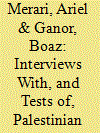

|
|
|
|
|
| Summary/Abstract |
This study was designed to investigate the background, psychological characteristics and motivations of independent actors who carried out attacks in Israel. It also examined the antecedent factors that influenced their decision to carry out an attack, and their retrospective attitudes to the act. Forty-five Palestinians who had carried out attacks against Israeli targets on their own initiative were interviewed in prison about their background, motivations, circumstances and process of the attack. Thirty-nine of them were also interviewed by a clinical psychologist and took a battery of psychological tests. Twenty-six of these were diagnosed as suffering from one or more of the following: psychotic background, severe personality disorder, and suicidality. A considerable number of the participants described personal, family or social problems that influenced their decision to carry out the attack. Three dominant motives for carrying out an attack were identified: suicidality, a psychotic state, and an ideological national-religious motivation. The characteristics of the attack were influenced by the dominant type of motivation. The discussion compares the findings of this study with those of a study on suicide bombers and with studies on behavioral characteristics of independent actors in other countries.
|
|
|
|
|
|
|
|
|
|
|
|
|
|
|
|
| 7 |
ID:
106851
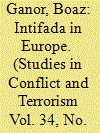

|
|
|
|
|
| Publication |
2011.
|
| Summary/Abstract |
Groups of second- and third-generation Muslim immigrants in Europe are increasingly undergoing radicalization processes that can lead to violent activity. These immigrants find relief for their frustrations in global jihadi ideology and radical Islam. In seeking to understand these radicalization processes within the European context, the author draws lessons from the Palestinian territories of the West Bank and Gaza on the eve of the "First Intifada" (popular uprising) in 1987. While these cases have different root causes and implications, the author's comparative analysis demonstrates that the social processes and generational clashes that lead to radicalization are shared by the two arenas.
|
|
|
|
|
|
|
|
|
|
|
|
|
|
|
|
| 8 |
ID:
118315
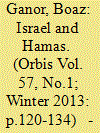

|
|
|
|
|
| Publication |
2013.
|
| Summary/Abstract |
Inarguably, the Islamist revolutions in the Arab countries' neighboring Israel, and the Muslim Brotherhood's rise to power in these countries, presents Israel with many, perhaps unprecedented, political and security challenges. However, in assessing the threat to its southern border, Israel must analyze in depth the intra- and extra-organizational influences on Hamas's motivation to attack, and formulate a responsible policy to ensure the safety of its citizens. Israel must use every means at its disposal to influence and pressure Hamas's leadership to choose responsibly, and avoid dangerous military "adventures."
|
|
|
|
|
|
|
|
|
|
|
|
|
|
|
|
| 9 |
ID:
094867
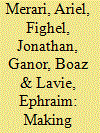

|
|
|
|
|
| Publication |
2010.
|
| Summary/Abstract |
Knowledge about the ways in which suicide attacks are recruited and prepared and on the motivation of suicide bombers and the factors that influence the decisions of organizers of suicide attacks has so far been sketchy and sporadic, derived mostly from media sources. In this study, 15 Palestinian would-be suicides and 14 organizers of suicide attacks participated in semi-structured interviews designed to fill this lacuna. The paper focuses on the self-reported feelings and behavior of the suicide bombers from recruitment to dispatching, as well as on the organizers' self-reported views and decisions concerning suicide attacks.
|
|
|
|
|
|
|
|
|
|
|
|
|
|
|
|
| 10 |
ID:
186056
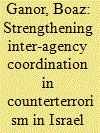

|
|
|
|
|
| Summary/Abstract |
The September 1972 Munich Olympics massacre brought to light the critical need for internal coordination and international cooperation among intelligence, security and enforcement agencies, government ministries, and many others who deal with counterterrorism. Through an historical overview of the role of the counter-terrorism bureau and with interviews of its former directors, this article presents the security lessons learned from the attack while providing an overview of the counterterrorism coordinator’s critical role in coordinating organisations focused counterterrorism operations, policy, and law.
|
|
|
|
|
|
|
|
|
|
|
|
|
|
|
|
| 11 |
ID:
178922
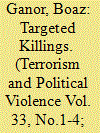

|
|
|
|
|
| Summary/Abstract |
The use of targeted killings as a counterterrorism strategy requires a well-calculated decision-making process. While targeted killings can be beneficial for the protection of national security, they might as well result in a “Boomerang Effect,” counterproductively increasing terrorists’ support and motivation to perpetrate other attacks. Which key ethical and operational questions should be asked to evaluate whether it is “worthwhile” to carry out a targeted killing operation? With special emphasis on the Israeli case study, this article draws an ethical paradigm to assess the legality and legitimacy of targeted killings. In addition, it presents six different quantitative and qualitative indexes that reflect potential benefits stemming from a targeted killing activity. These include (1) thwarting attacks; (2) damaging the organization’s activity; (3) morale effect; (4) deterrence; (5) changing the organization’s strategic decisions; and (6) the eradication of the organization. Finally, this “effectiveness model” suggests four criteria to examine the costs of the targeted killing activity over the short, medium and long terms.
|
|
|
|
|
|
|
|
|
|
|
|
|
|
|
|
| 12 |
ID:
081343
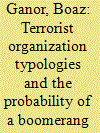

|
|
|
|
|
| Publication |
2008.
|
| Summary/Abstract |
Since the 1970s, many researchers have proposed typologies to sort the phenomenon of terror into different categories and to divide terror organizations into groups based on various characteristics of their activities. These typologies were designed to facilitate understanding of the phenomenon of terror and of terror organizations' processes, structures and operative methods. They relied on a variety of diagnostic criteria such as: motives for using terror, targets of the attacks, terrorists' demands, organizational structure; arenas of operation; and more. This article surveys major typologies of terror, notes the differences between them, presents a model to combine the different classifications of the typologies into a single typology, and proposes a new typology that sorts terror organizations by the variables that limit their activities. The proposed typology makes it possible to analyze terror organizations' behavior and even to forecast their reactions to a situation in which they are attacked by the enemy state-the boomerang effect.
|
|
|
|
|
|
|
|
|
|
|
|
|
|
|
|
| 13 |
ID:
191537
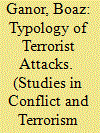

|
|
|
|
|
| Summary/Abstract |
Typologies of terrorist attacks enable researchers to analyze the complex phenomenon of terrorism in an organized manner, while facilitating the formulation of effective counter-terrorism policies. This paper contributes to the literature on typologies of terrorism by proposing a new conceptual model which classifies the various terrorist attacks that take place around the world according to two axes of reference: (1) the extent to which a terrorist organization is involved in the attack, and (2) The nature of interaction of the attacker/s with others. By placing the properties of various attacks on both axes, this article presents a new methodology that creates a typology of 32 different profiles of terrorist attacks, which can be grouped into 15 prototypes. The proposed model facilitates the examination of different types of terrorist attacks, while opening up new avenues of research.
|
|
|
|
|
|
|
|
|
|
|
|
|
|
|
|
|
|
|
|
|